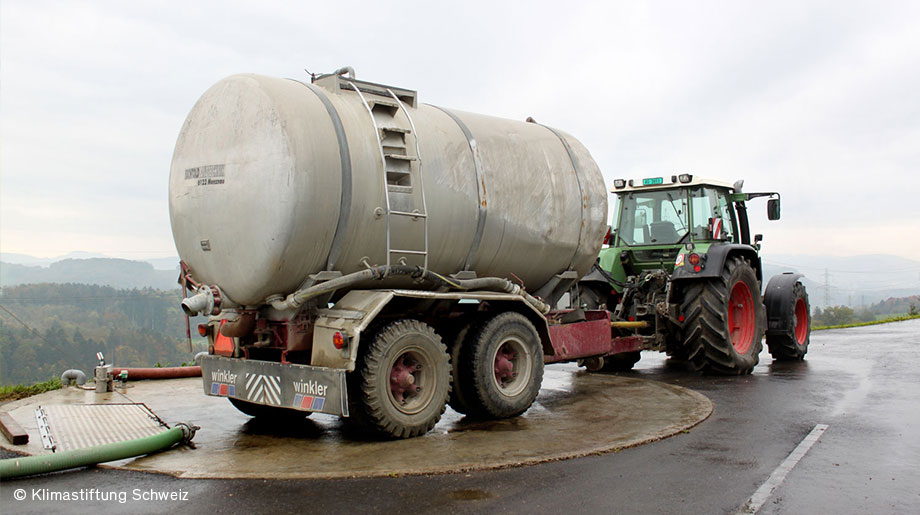Biogas Plants Reduce Methane Emissions (Switzerland)

Project type: Biogas
Project location: Cantons of Lucerne and Aargau, Switzerland
Project status: In operation, no credits available
Annual emission reduction of the whole project: 1,560 t
By building and operating these two agricultural biogas plants in Switzerland, power and heat are produced and methane emissions are prevented simultaneously.
Agricultural farmyard manure, such as liquid and solid manure, is still an untapped resource in Switzerland and far too rarely used for energy production. In the project’s biogas plants, animal excrement from farmyards and organic waste from other sources are fermented in a fermentation tank. The thereby produced biogas is converted into power and heat in a combined heat and power plant. The power generated is fed into the grid; the heat is used in the fermentation process of the biogas plant and to heat buildings. Finally, the fermentation residue is distributed as valuable fertiliser on the surrounding fields. But agricultural biogas plants do not only generate renewable energy, they also prevent methane emissions. Methane is a high-impact greenhouse gas and occurs when storing farmyard manure. Greater requirements have been put in place for biogas plants so that methane can no longer escape into the atmosphere. This is achieved with additional technical measures, such as double membrane roofs on the fermentation tanks, gas measurement and analysis devices, a covered end tank for fermentation residue and fermentation residue distribution on fields using drag hoses, as well as the frequent checking and measuring of the methane slip.
More attractive than farmyard manure for biogas production is other organic waste from fields and gardens, restaurants and the food industry (so-called co-substrates). This is richer in energy than farmyard manure and also provides more biogas from fermentation. Plant operators are also paid disposal compensation fees for the acceptance of these co-substrates, which means an additional source of income for the plant. However, demand for these energy-rich co-substrates has increased hugely in recent years and disposal fees have fallen greatly, which can quickly change a plant’s profitability. Agricultural biogas plants as climate protection projects use farmyard manure at a rate of at least 80 percent and co-substrates at a rate of no more than 20 percent. They can therefore only expect revenue from the use of co-substrates.
It is very difficult for smaller agricultural biogas plants to become profitable. High initial investments, low revenues from heat sales and co-substrate disposal, as well as low biogas production levels from the use of farmyard manure result in power generation costs that outstrip the electricity price guaranteed by cost-covering feed-in tariff. Only revenues from CO₂ certificates, which are issued in this project for the prevention of methane only, allow the implementation of these agricultural biogas plants and guarantee sustainable and profitable operation. The project comprises two plants in the cantons of Lucerne and Aargau and is developed and carried out by the Swiss Green Power Cooperative [Genossenschaft Ökostrom Schweiz].
This project contributes to 2 SDGs (as of end 2021):
Find out how myclimate reports these SDGs in our FAQ.
Provision of electricity and heat.
Over 383 tonnes of CO2 were reduced.
Situation without project
Methane emissions when storing farmyard manureDocumentations
Project standard

Partner

Project number
7157









